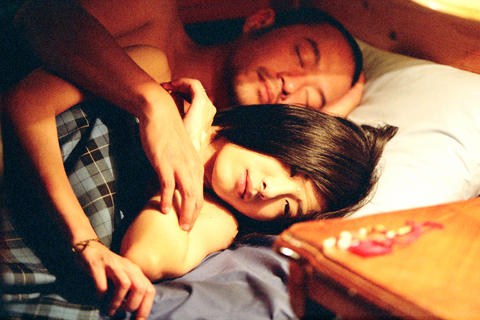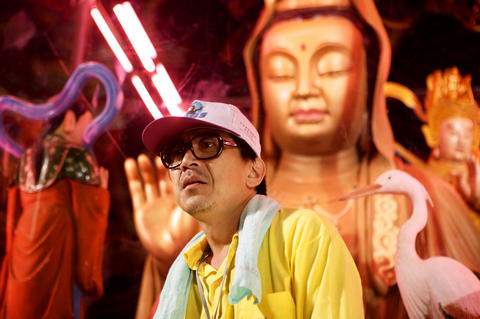Eight years after her critically acclaimed debut Bundled (我叫阿銘啦), director Singing Chen (陳芯宜) returns with her second feature, God Man Dog (流浪神狗人), an allegorical tale of contemporary Taiwan told through a mosaic of characters.
Blessed with a strong cast and production department, the film threads slices of Taiwanese life together with dreamlike visuals that linger in the mind long after the movie ends. God Man Dog has been well-received on the international film festival circuit and should also appeal to local audiences. It proves Chen, 34, is a promising, shining star among the younger generation of Taiwanese filmmakers.
The film follows the lives of characters from different ethnic groups, religious backgrounds and socioeconomic strata. It begins with Ching (Tarcy Su), a model suffering from postnatal depression who becomes increasingly estranged from her architect husband Hsiung (Chang Han) after their baby's death.

PHOTO: COURTESY OF 3RD VISION FILMS
Meanwhile, Aborigine Biung (Ulau Ugan) ekes out a living delivering fruit while attempting to cope with his alcoholism. His teenage daughter Savi (Tu Hsiao-han) escapes by becoming a kick boxer in Taipei and returns with expensive gifts after a friend enlists her in a scheme to steal money from the clients of a BDSM call-girl service.
In the third storyline, Yellow Bull (Jack Kao) drives a truck loaded with statues of deities who have been abandoned by their followers for not answering their prayers. Yellow Bull feeds stray dogs and takes in young drifter named Hsien, played by Jonathan Chang from Edward Yang's (楊德昌) Yi-Yi (一一), even though he hardly has enough money to replace his worn artificial leg. A car accident caused by a stray dog brings the three narratives together.
God Man Dog is technically accomplished and eloquently scripted. The film shows Chen as a surprisingly mature filmmaker who is able to look at the vices and virtues of Taiwanese society while telling an arresting story in a distinct style. It is an ambitious work that touches many issues, including the commodification of the body, the social problems faced by Taiwan's Aborigines, the anomie of city-dwellers, and the confused values of the young. Everything is tied together under a coherent structure by smooth editing and crosscutting between multiple characters and plot lines.

PHOTO: COURTESY OF 3RD VISION FILMS
Taiwan's collage of cultures finds a colorful epitome in Chen's vision, punctuated by the eerie sounds of a musical saw and cello by choreographer Sakamoto Hiromichi, of Hiroshima, Japan. Shen Ko-shang's (沈可尚) dynamic cinematography and atmospheric art direction by Huang Mei-ching (黃美清) help to fashion this visually imaginative film with a nod to magical realism: human-sized god puppets dancing in a deserted building, a neon-lit truck full of Buddhas wending its way through mountains under a dark sky.
On a narrative level, tragedy mixes with comedy. Storylines revolve around the film's central motif: how things are assigned value in Taiwanese society. "I reveal changing manmade values through items and things," Chen said. "Take the peach, for example. It is an expensive luxury in the eyes of Biung and his wife. In the film studio, it is merely something that can be consumed. But to Yellow Bull and Hsien, a peach is just a fruit to fill the stomach."
God Man Dog is laden with symbolism, but it is equally enjoyable for the entertainment seeker, with plenty of humorous moments of the kind that are rarely found in local productions. The most memorable of these come from the electrifying onscreen chemistry between veteran actor Kao and young Jonathan Chang. Kao shines in this film, breathing life into his Everyman role with a seemingly effortless, understated performance. Chang's equally eye-catching work suggests a star in the making. Pop idol-turned-serious actress Tarcy Su also turns in a convincing performance, although the plotline following the affluent urban couple is the film's weakest segment.

PHOTO: COURTESY OF 3RD VISION FILMS

Growing up in a rural, religious community in western Canada, Kyle McCarthy loved hockey, but once he came out at 19, he quit, convinced being openly gay and an active player was untenable. So the 32-year-old says he is “very surprised” by the runaway success of Heated Rivalry, a Canadian-made series about the romance between two closeted gay players in a sport that has historically made gay men feel unwelcome. Ben Baby, the 43-year-old commissioner of the Toronto Gay Hockey Association (TGHA), calls the success of the show — which has catapulted its young lead actors to stardom -- “shocking,” and says

The 2018 nine-in-one local elections were a wild ride that no one saw coming. Entering that year, the Chinese Nationalist Party (KMT) was demoralized and in disarray — and fearing an existential crisis. By the end of the year, the party was riding high and swept most of the country in a landslide, including toppling the Democratic Progressive Party (DPP) in their Kaohsiung stronghold. Could something like that happen again on the DPP side in this year’s nine-in-one elections? The short answer is not exactly; the conditions were very specific. However, it does illustrate how swiftly every assumption early in an

Inside an ordinary-looking townhouse on a narrow road in central Kaohsiung, Tsai A-li (蔡阿李) raised her three children alone for 15 years. As far as the children knew, their father was away working in the US. They were kept in the dark for as long as possible by their mother, for the truth was perhaps too sad and unjust for their young minds to bear. The family home of White Terror victim Ko Chi-hua (柯旗化) is now open to the public. Admission is free and it is just a short walk from the Kaohsiung train station. Walk two blocks south along Jhongshan

Francis William White, an Englishman who late in the 1860s served as Commissioner of the Imperial Customs Service in Tainan, published the tale of a jaunt he took one winter in 1868: A visit to the interior of south Formosa (1870). White’s journey took him into the mountains, where he mused on the difficult terrain and the ease with which his little group could be ambushed in the crags and dense vegetation. At one point he stays at the house of a local near a stream on the border of indigenous territory: “Their matchlocks, which were kept in excellent order,